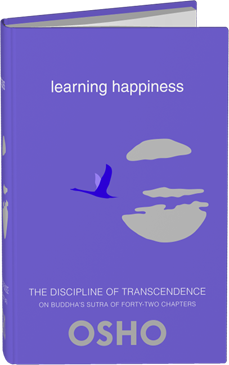The Discipline of Transcendence deel 3

“Mind is the most complex phenomenon on earth, the most subtle flowering of consciousness. If you want to really understand what the mind is, then you will have to detach yourself from it and learn how to be just a witness.” Osho
In Learning Happiness, Osho explains why Buddha insists that happiness does not have to be created. He says that perhaps the most fundamental truth that Buddha brought to the world is his penetrating insight into the essential nature of happiness. It already exists in the present moment—all that has to be learned is the knack of living in the present.
Osho outlines and clarifies the three steps—Buddha’s carefully defined path to liberation—and talks about the transcendence of moving from sex to spirituality.
The Discipline of Transcendence deel 3
Learning Happiness is inmiddels zo’n geliefd boek dat zelfs deze nieuwe druk alweer opnieuw verschenen is, met een prachtige purperen cover.
Dit boek is het 3e deel van ‘The Discipline of Transcendence’ met een actuele vormgeving. Doorgaand  geluk is er niet zomaar, hiervoor is een doorgaande transformatie nodig en dan kun je ook tot de top gaan. Dit boek is het Commentaar op een van Buddha’s vroegste werken. Osho legt uit waarom Buddha vindt dat geluk niet gecreëerd hoeft te worden. je hebt slechts ‘de kunst’ ervan te leren.
geluk is er niet zomaar, hiervoor is een doorgaande transformatie nodig en dan kun je ook tot de top gaan. Dit boek is het Commentaar op een van Buddha’s vroegste werken. Osho legt uit waarom Buddha vindt dat geluk niet gecreëerd hoeft te worden. je hebt slechts ‘de kunst’ ervan te leren.
Het boek Learning Happiness is verkrijgbaar bij de Boekhandel.
Impressie van Learning Happiness
On Buddha’s Sutra of Forty-two Chapters
This is the third of four volumes in which Osho comments on the 42 earliest-known teachings of Buddha. Here is Buddha alive, relevant, scientific in insight, and very human.
Perhaps the most fundamental truth that Buddha brought to the world is his penetrating insight into the essential nature of happiness. In The Discipline of Transcendence volume 3 Osho explains why Buddha insists that happiness does not have to be created. It already exists in the present moment; all that has to be learned is the knack of living in the present.
Osho outlines and clarifies the three steps in Buddha’s carefully defined path to liberation: the path of awareness, the journey from sex to spirituality.
“Happiness is where you are; wherever you are, happiness is there. It surrounds you. It is a natural phenomenon. It is just like air, just like sky. Happiness is not to be sought: it is the very stuff the universe is made of.” Osho
Excerpt from Learning Happiness
Preface
Happiness and unhappiness are both there in your life. Happiness may be just a little, perhaps only a glimpse, a hope or even an illusion, but still it is there. And unhappiness is there as well. You want to get rid of the unhappiness, so you approach the one who knows because he offers you some possibility of relief from your unhappiness. But when you approach the man who knows he tells you to cast off the happiness as well as the unhappiness, because only then can knowing happen.
Really, this is where the difficulty lies. You don’t want to cast off the happiness that is yours. You have only recently got married; the wife is beautiful, people have been congratulating you, expressing their delight that you are married and now you have the one you wanted. You want to preserve this happiness. The arrangement you are seeking is one in which the unhappiness of the world disappears but the happiness remains — and this is impossible. No one has ever been able to manage this, nor ever will, because the happiness and unhappiness of the world are two sides of the same coin. Either you retain the whole coin or you throw the whole coin away. You are trying the impossible and that is why you are divided within yourself. You want to leave one half and keep the other. But this life cannot be divided. Life is whole, to divide it is impossible.
Overview
“‘Mind is the most complex phenomenon on earth, the most subtle flowering of consciousness. If you want to really understand what the mind is, then you will have to detach yourself from it and learn how to be just a witness.’ In Learning Happiness, Osho explains why Buddha insists that happiness does not h
ave to be created. He says that perhaps the most fundamental truth that Buddha brought to the world is his penetrating insight into the essential nature of happiness. It already exists in the present moment—all that has to be learned is the knack of living in the present. Osho outlines and clarifies the three steps—Buddha’s carefully defined path to liberation—and talks about the transcendence of moving from sex to spirituality.”